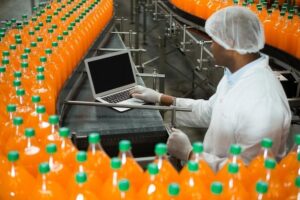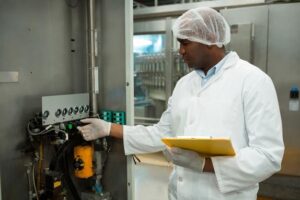Last Updated on October 22, 2023 by Kevin Chen
Image of food and beverage industry: source Freepik
The food and beverage industry has been undergoing continuous evolution thanks to technological growth. Compared to the past, it is easy to identify major disparities between how things were conducted in the past and how they are done right now. Also, the fact that the food and beverage industries cover a wide scope means that the growth and changes have affected many aspects of the industry.
At the center of all these technological advancements are the integrated circuits, which are popularly referred to as chips or even microchips. IC chips are responsible for running and controlling all modern electronic devices. Take a look at any electronic device or appliance in the food and beverage industry, its working principle is defined by the presence of integrated circuits. In this article, we are going to discuss the impact of IC chips on the technological growth and advancement of the food and beverage industry. We will highlight some of the specific functions of integrated circuits in the industry of food ad beverage industry and lastly, we will also cover the future of IC chips in the industry.
Digitization in the food and beverage industry
Integrated circuits have paved the way for shifting the world into a digital system. This is because they are the drivers of the digital electronics. Whether it is a computer, laptop or smartphone, its running depends on the microchips.
Digitization has impacted the F&B industry in many different ways. Most restaurants have gone paperless as all the orders are availed on various digital devices such as tablets. Also, customers can see the meals that are provided in restaurants and hotels without having to be physically present. Digitization has also improved efficiency and data management in the food and beverage industry.
Automation in the food and beverage industry
Image source Freepik
Closely related to digitization is the automation of systems in the F&B industry. There is minimal human involvement thanks to the machines and systems that are fully automated to execute different tasks.
Starting with food and beverage production, there are machines that are designed to prepare products automatically. They have interfaces that allow human controllers and supervisors to enter instructions and everything else will be executed as expected.
Integrated circuits have a direct impact on the automation of systems in the F&B industry. All the automated machines and systems depend on the electronic components that are brought together to function as integrated circuits
One direct impact of automation in F&B is fast production. Automated systems are capable of handling large volumes of products and materials within a short period. The production rates in the food and beverage industry have been on an upward trend.
Additionally, automation has improved accuracy and efficiency in the production of the food and beverage industry. Automated machines operate with high levels of accuracy and also minimize wastage of the materials during the production process. We cannot ignore the impact of automation on the cost of production. Machines have replaced the cost of human capital or there has been a reduction of the wage expenses.
Better data and inventory management in the food and beverage industry
We cannot deny the fact that integrated circuit chips have improved the process of data management across all aspects of life. Food and beverage is one of the industries that has derived immense benefits from this.
The use of data in the F&B industry starts with inventory management by both the small and big players in the industry. The fact that most products in the F&B industry are perishable means that proper inventory management is vital. It will protect businesses from losses due to expiry.
Integrated circuits are at the core of data and inventory management in the F&B industry. Devices used for the storage and management of data are run by integrated circuits. We even have specialized memory chips that specifically execute data-related tasks on electronic devices.
Beyond the basic data functions, there is the use of big data in the F&B industry. Large datasets are stored and used for developing algorithms which later on will be used for developing machine learning and AI applications in the food and beverage industry. Big data is a critical component in implementing critical decisions in the F&B industry, whether it is in the production or marketing of food and beverage products.
Transport
Transport is an important component of the food and beverage industry. It is one of the areas that have been revolutionized by integrated circuit chips. F&B is a time-sensitive industry due to the fact that both the raw materials and the finished products should be delivered in good time. The transport system to support the industry should be efficient and reliable.
Integrated circuits have led to the development of better transport systems that are used for the F&B industry. Automotive ICs are used in vehicles to enhance their performance, efficiency, and reliability. Also, ICs make it possible to include other functions in transport systems. One of them is the cooling system whereby coolers are integrated into transport systems.
All the other advanced means of transport base their functionalities on integrated circuits. Even air transport, which is preferred for transporting perishable food and beverage products has many types of integrated circuits.
Communication systems
Like any other relevant industry, the food and beverage industry is heavily characterized by constant communication between different players. Key stakeholders such as manufacturers, suppliers distributors, and clients rely on communication gadgets to relay messages to each other.
Microchips have revolutionized the field of telecommunication. All communication devices have integrated circuits, whether it is smartphones, tablets computers, or any other gadget. Even the infrastructure and systems that are built to support communication systems also depend on integrated circuits.
Improved safety of the products
Safety is an important feature in the production of food and beverages. Proper safety measures have to have adhered to. There are various systems and solutions that are used for testing products to ensure that they are fit for human consumption. They are more accurate when it comes to testing than the traditional testing methods.
Additionally, there are modern packaging solutions that are embedded with specialized chips that ensure the conditions inside the food or beverage packages remain in perfect condition. These chips have sensors to detect various conditions such as temperature and humidity.
Sustainability in the food and beverage industry
Currently, the issue of sustainability is a hot topic in all industries. There are spirited efforts that are made with the goal of environmental conservation. IC chips are making a significant impact to promote sustainability in the food and beverage industry.
One of the ways is through power management. Chips are used to optimize power consumption of different equipment used in the production of food and beverages. Power IC chips are a perfect example of these chips. Electronic waste management equipment are embedded with integrated circuits.
What is the future of IC chips in Food and Beverage?
We have covered the current applications of IC chips in the food and beverage industry. What areas of this industry should we expect to see major developments?
AI is deemed to be the next big thing in the food and beverage industry. As we have mentioned, the presence of AI is already felt in some areas of F&B. There have been talks of replacing servers in restaurants with AI robots. We should expect more of such developments when the industry of artificial intelligence blows beyond the expected proportion. We will have more devices and appliances that will be powered by artificial intelligence and machine learning. Of course, this will be fueled by the deeper development of AI chips.
Another thing that e should expect in the future of the food and beverage industry is the smart production process. This will be fueled by big data and IoT fields of technology whereby production processes will be guided by data and connectivity. Through smart production, it will be easy to control food and beverage production processes from remote locations.
We also expect enhanced collaborations to define the direction of food and beverage production processes. Different players in the industry are expected to collaborate in order to develop and utilize the latest technologies. For example, IC chip manufacturers will have to work with big names in the food and beverage industry to develop specialized chips.
Conclusion
From this article, it is clear that integrated circuits have revolutionized the Food and beverage industry. They have improved safety and efficiency ratings in this industry. Going by the look of things, we should expect better changes in the coming years.
Are you working of a product that will be used in the F&B industry? It will be a smart move to start by buying the right IC chip. Once you know the exact microchip that will be perfect for your product, the next step will be choosing a reliable IC chip supplier and distributor in China. You will work on all modalities to ensure that the microchips are delivered for your application.
If you want to find more Electronic Components Distributors, please check out the following articles:
Electronic Components Distributors In the USA
Electronic Components Distributors In UK
Electronic Components Distributors In China
Electronic Components Distributors In India
Electronic Components Distributors In Singapore
Electronic Components Distributors In Malaysia
Electronic Components Distributors In Vietnam
Electronic Components Distributors In South Korea
- Where to buy IC chips? The Best Guide? - March 26, 2024
- Breaking Down Barriers: Overcoming Obstacles in Cross-Border Electronic Component Trade - March 4, 2024
- Everything You Need to Know About Amplifier IC Chips - March 4, 2024






